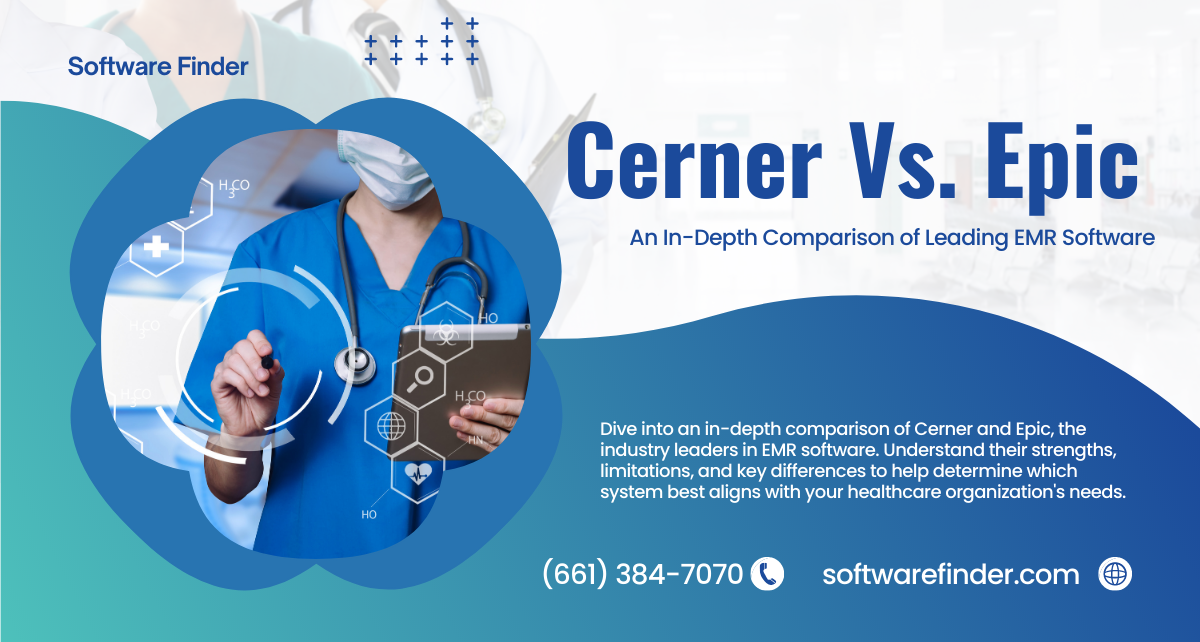Today’s healthcare environment is rapidly transforming, and the need for efficient and accurate medical records has never been greater. Electronic Medical Record (EMR) software has come to the forefront in facilitating this need, with two industry leaders taking center stage: Cerner EMR and Epic EMR. Let’s dive into a detailed comparison of Cerner and Epic to see which EMR software might best serve your healthcare organization’s needs.
The Rise of EMR Software
Before we dive into the specifics of Cerner vs. Epic, it’s important to understand the significant role EMR software plays in the modern healthcare landscape. EMR software not only digitally stores patient records but also enables medical professionals to quickly access and interact with these records, enhancing the overall quality of patient care.
About Cerner
Cerner Corporation, founded in 1979, is one of the oldest and most established providers of health information technologies in the world. Known for its comprehensive suite of software, Cerner’s EMR solution, PowerChart, is utilized across various healthcare settings, from large hospitals to small physician practices.
Advantages of Cerner
- Robust functionality: Cerner offers extensive modules, including laboratory, pharmacy, radiology, and numerous medical specialties. This broad scope caters to diverse healthcare needs.
- Integrated revenue cycle management: Cerner’s integrated revenue cycle management simplifies billing and collections, helping organizations improve their bottom line.
- Interoperability: Cerner supports data exchange with other EMR systems, promoting collaboration and continuity of care.
Limitations of Cerner
- User interface: Some users find Cerner’s interface somewhat dated and less intuitive compared to newer systems.
- Training needs: Given its extensive functionality, Cerner can be complex, often necessitating substantial training for efficient use.
About Epic
Founded in 1979, Epic Systems Corporation is another giant in the field of health information technology. Their EMR solution, EpicCare, is designed to serve large healthcare organizations and is recognized for its high level of customization and comprehensive capabilities.
Advantages of Epic
- Customization: EpicCare offers high levels of customization, which allows healthcare organizations to tailor the software to their specific needs.
- Comprehensive suite: Epic provides a holistic view of patient care by integrating clinical, billing, and administrative functions into one platform.
- Data analytics and reporting: Epic excels in data analytics and reporting capabilities, aiding decision-making and improving patient outcomes.
Limitations of Epic
- Cost: Epic can be more expensive than other EMR systems, making it less accessible for smaller practices or organizations with tight budgets.
- System complexity: Similar to Cerner, Epic’s vast capabilities can lead to a steep learning curve and significant training requirements.
Cerner vs. Epic: Key Differences
System Size and Target Audience
Epic is designed to serve large health systems with extensive resources, while Cerner caters to a broader range of health organizations, including smaller practices. Cerner’s broader target audience may make it a more suitable option for organizations of varying sizes and budgets.
Interoperability and Integration
Both Cerner and Epic are committed to data sharing and interoperability. However, Cerner has made significant strides in recent years with its open approach to data exchange. Cerner’s collaboration with other health IT vendors could potentially make it a more appealing option for organizations aiming for seamless data integration.
User Interface and Training
Both systems require significant training due to their complexity. However, Epic is often lauded for its modern and user-friendly interface, which may lessen the learning curve and improve user adoption.
System Scalability
When it comes to scaling operations, Epic often takes the lead. It is built for extensive healthcare networks with a robust infrastructure. Epic can manage large volumes of data without any degradation in performance, making it a popular choice among large hospitals and multi-site health systems.
Cerner, on the other hand, offers decent scalability, but its main strength lies in its flexibility to cater to both small and mid-sized practices as well as larger hospitals. For organizations that anticipate moderate growth or have budget constraints, Cerner might be a more viable option.
Implementation Process and Support
Epic’s implementation process is comprehensive and typically handled by Epic’s in-house team. It is known to be meticulous, with extensive attention to detail, thus ensuring a smooth transition. However, this extensive implementation process can be time-consuming and expensive.
Cerner offers flexible implementation strategies tailored to the specific needs of the organization. They also provide ongoing support through CernerWorks, a service that offers operational, technical, and clinical support.
Regulatory Compliance
Both Epic and Cerner demonstrate a strong commitment to regulatory compliance. Epic is known for its prompt updates whenever new healthcare regulations are introduced, ensuring that its users remain compliant. Cerner also takes regulatory changes seriously, quickly updating their software to align with the latest healthcare laws and regulations.
Patient Engagement Tools
Epic’s MyChart and Cerner’s HealtheLife are the patient engagement tools associated with each software. MyChart from Epic allows patients to access their medical records, make appointments, request prescription refills, and communicate with their care team. It also supports bill payments and check-in processes.
HealtheLife from Cerner offers similar functionalities, along with personalized health goals, daily metrics for patients to understand their health status better, and secure video visits. The choice here would depend on the specific patient engagement features that align best with your healthcare organization’s objectives.
Data Security
In today’s digital age, data security is crucial. Both Epic and Cerner prioritize patient data security. Epic’s security module, Hyperspace, allows organizations to define role-based access, ensuring that only authorized individuals can access sensitive patient information.
Cerner also prioritizes security with numerous protocols and encryptions in place to protect against potential data breaches. Cerner’s dedication to cybersecurity is further demonstrated by their collaboration with the Department of Defense (DoD) and the Veterans Affairs (VA) to secure patient data.
Conclusion: Cerner or Epic – Which is Right for You?
The choice between Cerner and Epic ultimately boils down to your organization’s unique needs. If you are a large-scale healthcare system that requires high levels of customization and extensive data analysis, Epic may be the ideal choice. On the other hand, if your organization is smaller or seeks robust interoperability, Cerner might be a more suitable fit.
Remember, EMR software is a significant investment, both financially and operationally. Therefore, it’s crucial to consider your organization’s specific needs, resources, and long-term goals when deciding between Cerner and Epic. Both EMR systems are leaders in the healthcare industry, and either could potentially transform your practice’s operations, efficiency, and overall patient care.




